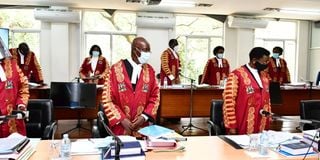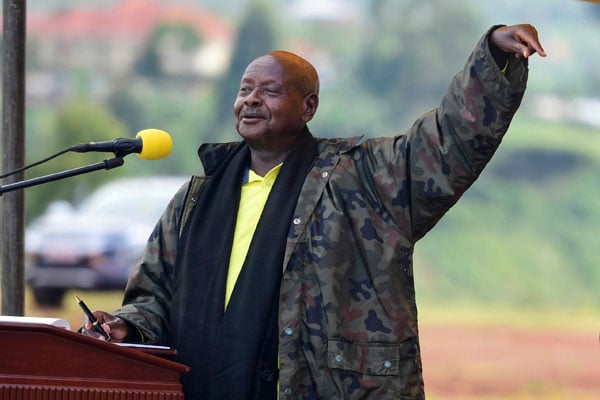Prime
Supreme Court dismisses Bobi's application to amend petition

What you need to know:
- The judges unanimously ordered Kyagulanyi through his lawyers to present evidence to prove their case.
The Supreme Court in Uganda has dismissed an application by National Unity Platform (NUP) presidential candidate Robert Kyagulanyi alias Bobi Wine to amend his election petition challenging President Museveni’s victory.
The musician turned politician through his lawyers led by Mr Medard Ssegona had asked court to amend the petition to allow more evidence on grounds that after the presidential elections on January 14, he (Kyagulanyi) was placed under house arrest which subjected him to post election detention trauma that hindered him from putting together all the evidence he had for his petition in the stipulated time (15 days).
Mr Kyagulanyi had presented 15 new electoral offences in the application.
However, a panel of nine Justices led by the Chief Justice Alfonse Owiny-Dollo dismissed Mr Kyagulanyi's application on grounds that the matters brought challenging the legality of Museveni election are new and were filed out of time.
The judges unanimously ordered Kyagulanyi through his lawyers to present evidence to prove their case.
Earlier, Mr Museveni, the electoral commission through their lawyers and the Attorney General, Mr William Byaruhanga (3rd respondent) had also asked the Supreme Court to dismiss the application for amendment.
"The election petition is constitutionally time-bound. The petitioner has had time to read through my answers and then come up with amendments. The said (amendment) application is intended to defeat the answers of the respondent,” Mr Byaruhanga said.
The ruling was read by Justice Stella Arach Amoko on behalf of the nine Justices.
Others are Paul Mugamba, Dr Esther Kisakye, Ezekiel Muhanguzi, Mike Chibita, Night Percy Tuhaise.
Museveni victory
Museveni, a 76-year-old former rebel leader who has ruled since 1986, won a sixth term with 58.4 percent of the vote, according to the latest updated count from the electoral commission.
Mr Kyagulanyi, secured 35.1 percent and slammed the vote as a sham.
Under the constitution Mr Kyagulanyi had 15 days from the declaration of results by the electoral commission to challenge the outcome.
Losing candidates have sought unsuccessfully in the past to overturn Museveni's wins in court. One of Africa's longest-serving rulers, Museveni has won every election since 1996, almost all marred by allegations of irregularities.
'Invaded polling stations'
There were allegations that soldiers invaded polling stations and stuffed ballot boxes with pre-ticket votes in addition to tampering with electoral registers.
Mr Museveni, however, declared the election the cleanest in Uganda's post-independence history.
The run-up to the vote was marred by violence, and a sustained crackdown on government critics and Museveni's rivals.
In November, at least 54 people were shot dead by security forces loyal to Museveni during protests against one of Mr Kyagulanyi’s numerous arrests.
The opposition leader was held under effective house arrest from polling day until a court ordered security forces end his detention last week.
Access to the headquarters of his political party, the National Unity Platform (NUP), has been blocked for weeks now.
Kidnapped, tortured supporters
Several supporters of Mr Kyagulanyi across the country have been kidnapped by armed men believed to be security operatives and tortured. Some are still missing as relatives trace their whereabouts or wait for them to be arraigned in court.
The latest victim is one Ronald Segawa, 22, who had appeared in a video, encouraging Ugandans to vote for Mr Kyagulanyi.
He was reportedly trailed by security operatives, abducted and detained for the two weeks he had gone missing.
“He was later dropped off at Mulago mortuary- those who picked him thought he was dead. He was burnt, electrocuted and his fingernails plucked out. Puss has been oozing out of his nose and eyes. His entire body bears marks of extreme torture. He remains unconscious. That's why we're taking Gen. Museveni to the ICC. These crimes against humanity must be accounted for,” Mr Kyagulanyi tweeted.
By law, Mr Kyagulanyi must prove to the court that any alleged irregularities affected the outcome of the election "to a substantial manner" - a much higher burden of proof than in civil cases.
Ugandan courts do not "look at elections as a process but only at events on polling day and declaration day, which makes it very difficult to prove substantial effect of fraud wrongdoing," independent election analyst Crispin Kaheru said earlier.





